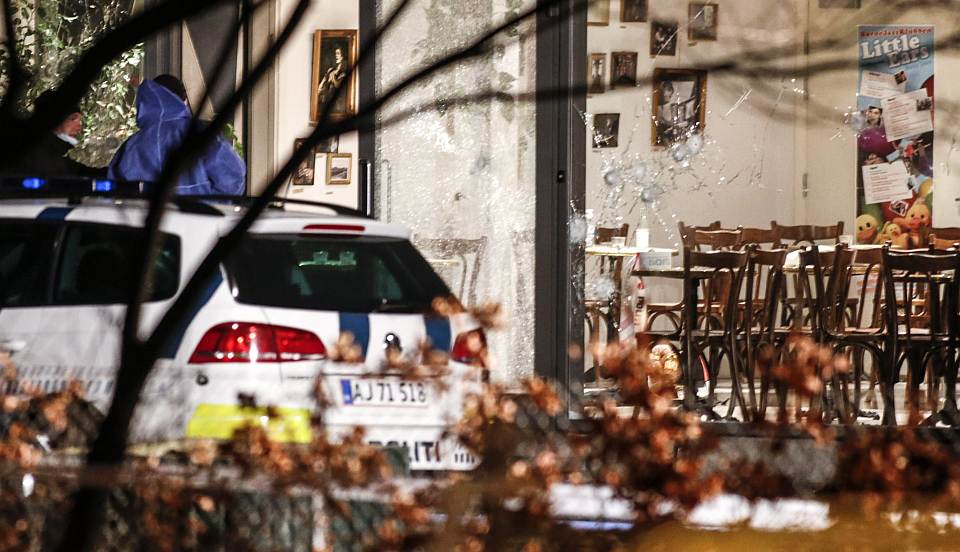After Copenhagen: resist the empire of offence
The biggest threat to free and open debate is the fear of giving offence.

Like the Paris massacre last month, the shooting spree in Copenhagen at the weekend started with an attack on a site that symbolised free speech and ended with an assault on a building used by Jews.
I didn’t watch the events in Copenhagen unfold on the news. The first I heard of what was going on was when I listened to a phone message left by a friend. She sounded upset; her voice was strained as she asked, ‘After this mess in Copenhagen, are you still going to go to Amsterdam to debate?’.
Although her message was framed as a question, it was clear she was worried about my involvement in an upcoming debate in Holland, titled ‘Free speech after Charlie Hebdo’. My immediate reaction was to dismiss such concerns as an over-the-top response to the tragic events in Denmark. After all, Western Europe is one of the safest regions of the world, and exercising the right to free speech rarely exacts a significant cost. However, the more I thought about my friend’s message, the more I began to be concerned by things that, thankfully, I have never needed to think about before.
The Krudttoenden cultural centre in Copenhagen was holding a peaceful and civilised discussion on free speech when it came under gunfire. When I looked at the pictures of this cultural centre, my thoughts turned from the plight of the victims to the realisation that this event was held in a building that was very much like the one that is hosting my debate in Amsterdam. Did I feel a slight pang of unease when I realised that the topic of the debate in Copenhagen was not a million miles from what I will be discussing in Amsterdam? Yes, is the answer. But what really disturbed me was the realisation that we have now moved into a world where the idea of a genuine clash of views on a controversial subject is increasingly associated with physical threats.
The likely target of the Copenhagen attack was the Swedish cartoonist Lars Vilks. He has acquired a reputation for being a provocateur and, since the publication of his cartoon of Muhammad in 2007, has faced many threats to his life. In 2013, he, along with other ‘offensive’ artists, was placed on a hit list published by al-Qaeda.
Like his ill-fated Charlie Hebdo colleagues, Vilks is considered by many to be inflammatory and offensive to many Muslims. Likewise, Vilks’ critics argue that, through his provocative work, he has brought the wrath of angry Islamists on himself. Many institutions and publications have been wary of giving him a voice, and he has had numerous lectures and exhibitions cancelled by cultural organisations. Sadly, far too many public figures and institutions take the view that anything that provokes Muslim sensibilities cannot be said. Indeed, their argument sometimes goes so far as to imply that the only way to prevent murderous attacks, such as the one in Copenhagen, is to cease publishing provocative cartoons and articles that Muslim people find offensive.
I must confess that I am not a fan of Charlie Hebdo or cartoonists who, instead of making a deeper point, opt for insulting their target. I find that such self-consciously in-your-face cartoons tend to infantilise discussion about difficult problems that actually require serious thought. But we don’t get to choose whose freedom of speech we uphold. Cartoonists have every right to offend, since that is what free speech is all about. By its very nature, the free exchange of views and sentiments will inevitably result in someone being offended. Throughout history, every new and important idea has been deemed offensive.
Alongside regarding freedom of speech as inviolable regardless of the offence it causes, there is also an absolutely compelling argument for not making concessions to the ‘I am offended’ lobby. In the Western world, the ‘feeling offended’ sensibility has acquired an expansive and unrestrained quality. Those who are offended by the work of Vilks will not be placated by the censoring of his cartoons. Tomorrow, they will raise objections to an ‘offensive’ essay that criticises one of their cherished beliefs. The day after tomorrow, they will express their offence at a supermarket that sells pork in the wrong neighbourhood. And other groups of the offended will pile in to demand the silencing of their critics.
The concessions already made to those claiming offence have led to the ongoing expansion of words that cannot be said, and the continued extension of what is deemed unacceptable behaviour. What has also expanded are the death threats. You don’t need to be a cartoonist to invite a threat to your life. This week, the media reports that the artist Paul Cummins, whose poppy installation drew millions of people to London last year, has received death threats because some of the money raised by his project has gone to charities that have connections with the military.
Many, including Vilks, have predicted that after the Copenhagen murders it will be even more difficult to organise open debates on issues that hardline groups regard as offensive. And now, with the news that a Jewish radio broadcaster in Copenhagen has been forced to shut down for security reasons, the fight for freedom of speech has become ever more urgent. Instead of looking for excuses, we have to insist that speaking out and defending free speech is as important today as it ever was.
Frank Furedi is the author of On Tolerance: A Defence of Moral Independence, published by Continuum. (Buy this book from Amazon(UK).)
To enquire about republishing spiked’s content, a right to reply or to request a correction, please contact the managing editor, Viv Regan.









Comments
Want to join the conversation?
Only spiked supporters and patrons, who donate regularly to us, can comment on our articles.